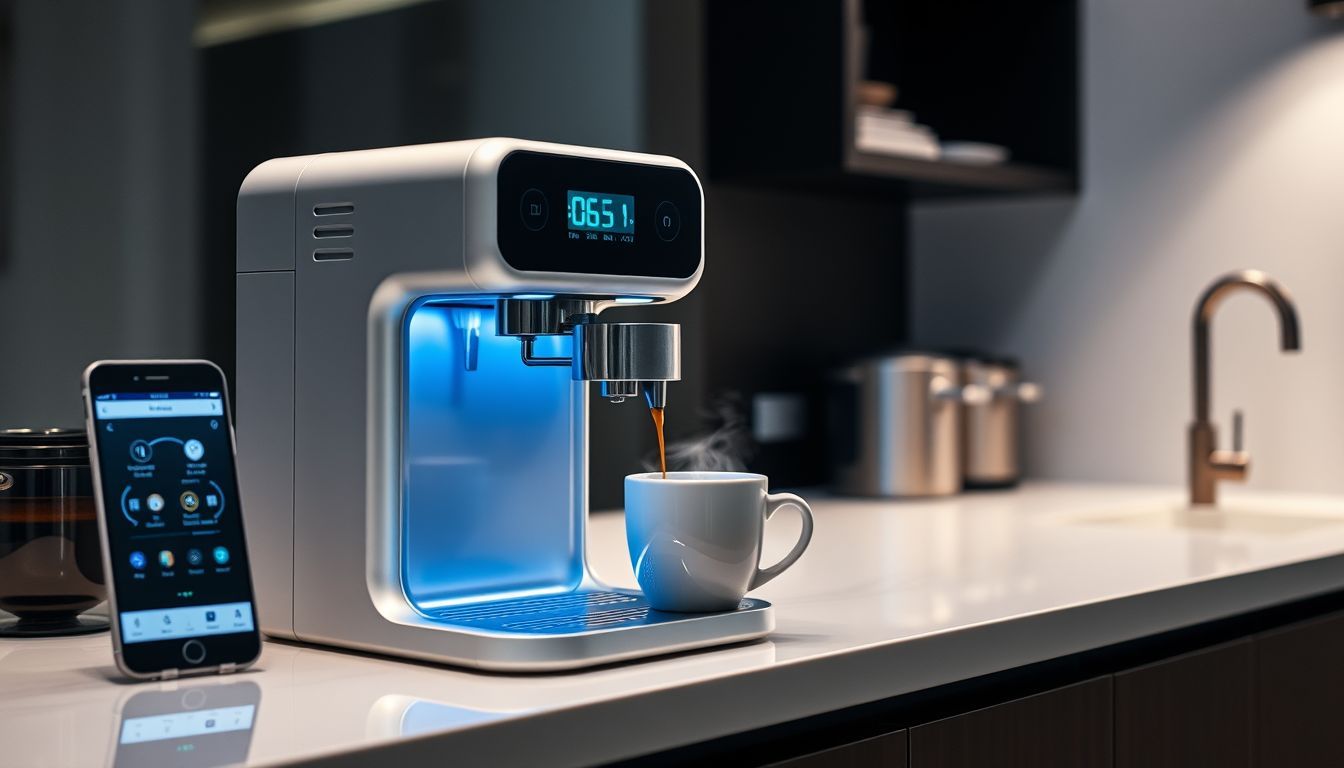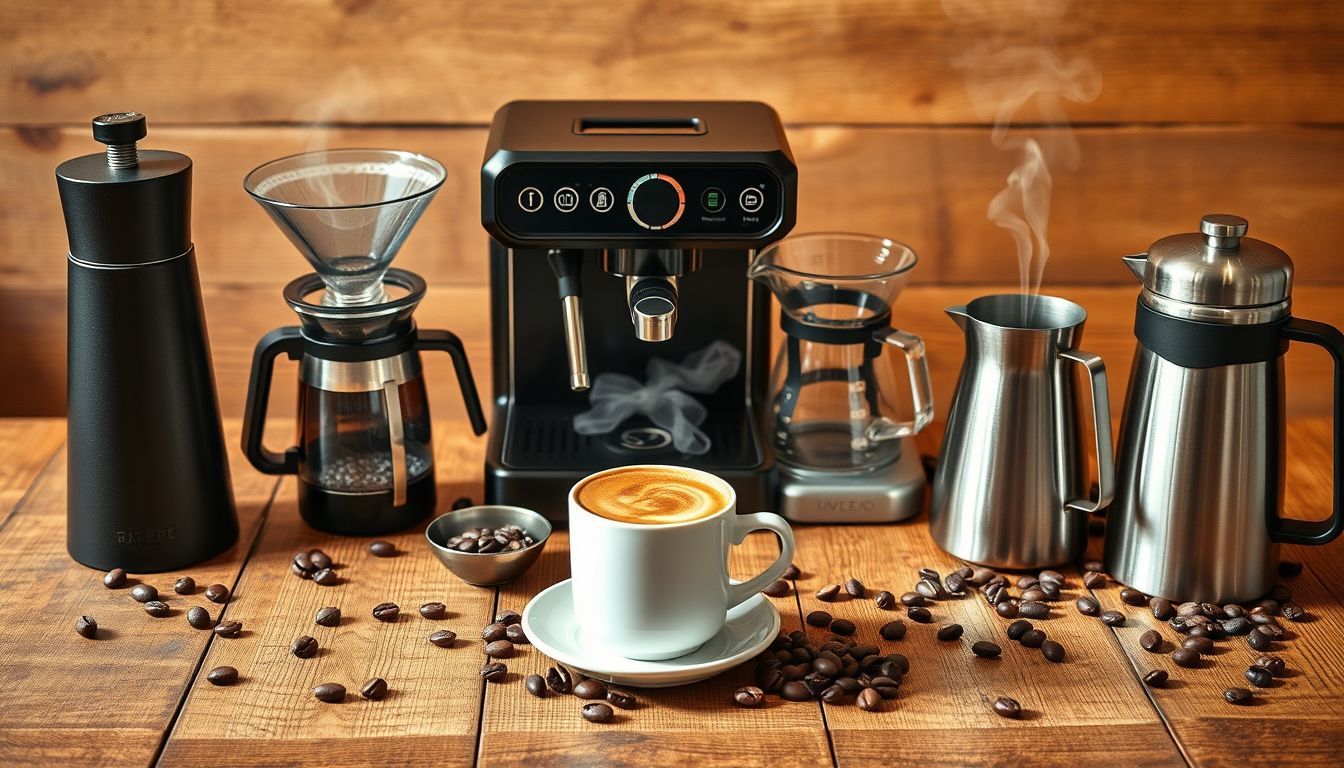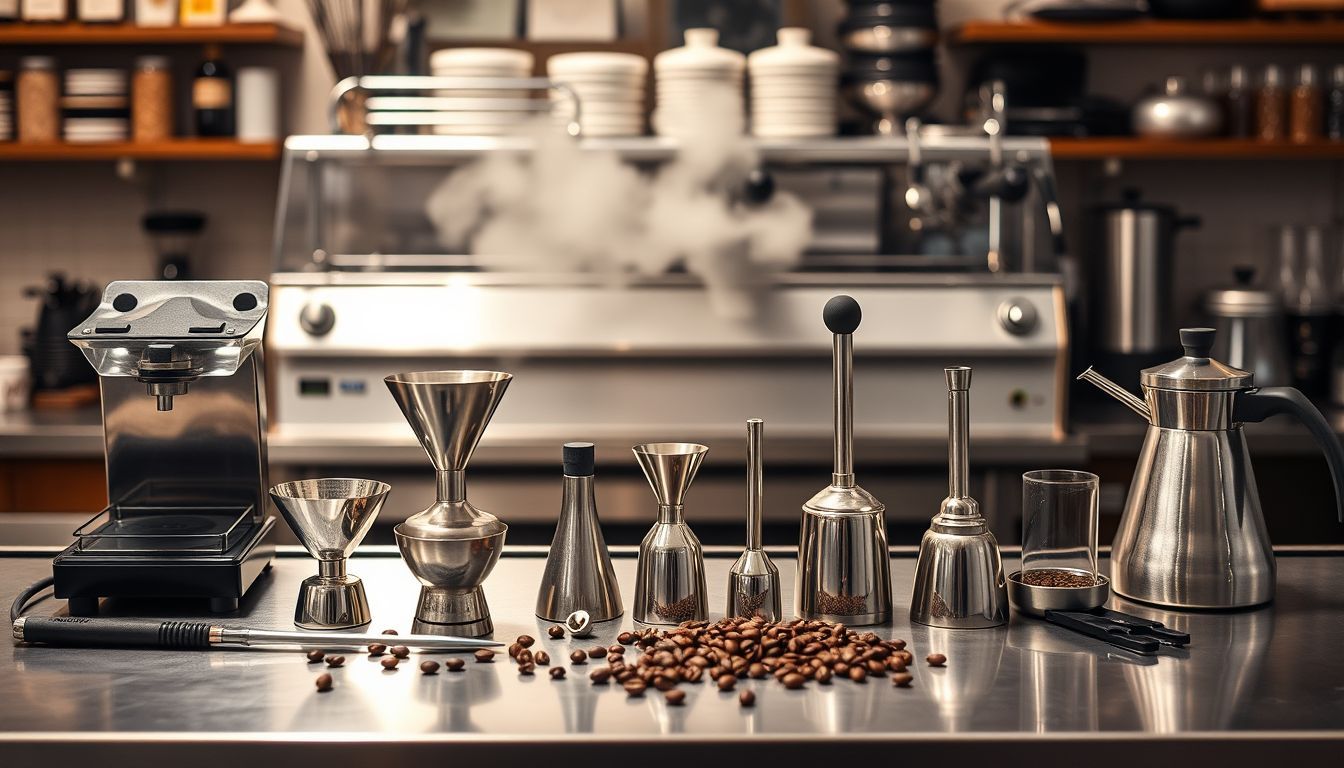Why Smart Coffee Makers Are the Future (Despite What Purists Say)
Smart coffee makers are evolving beyond gimmicks to deliver genuine value. From precision brewing to predictive maintenance, discover how AI and connectivity are transforming coffee.

Amazon Affiliate Disclosure
This post contains affiliate links. If you purchase through these links, we may earn a small commission at no additional cost to you.
Why Smart Coffee Makers Are the Future (Despite What Purists Say)
Last week, I watched my neighbor's smart coffee maker automatically adjust its brewing temperature based on the weather forecast, order replacement filters when supplies ran low, and send her a notification that her favorite Ethiopian beans were on sale at the local roastery. Meanwhile, my "traditional" espresso machine sat silently on the counter, blissfully unaware that it was slowly clogging with mineral deposits and that I'd been pulling increasingly sour shots for three weeks.
This moment crystallized something I've been reluctant to admit: despite years of dismissing smart coffee makers as overpriced gimmicks, the technology has quietly evolved into something genuinely useful. While early smart coffee makers were essentially regular machines with WiFi bolted on, today's intelligent brewing systems are beginning to solve real problems that have plagued coffee enthusiasts for decades.
As someone who has tested hundreds of coffee machines and initially scoffed at the idea of app-controlled brewing, I've been forced to confront an uncomfortable truth: smart coffee makers aren't just the future—they're becoming the present, and they're getting remarkably good at making excellent coffee while eliminating many of the frustrations that come with traditional equipment.
Today, we're exploring why smart coffee technology has moved beyond novelty to necessity, how artificial intelligence is revolutionizing brewing consistency, and why even the most ardent coffee purists might need to reconsider their stance on connected brewing equipment.
The Evolution of Smart Coffee Technology
To understand why smart coffee makers represent the future, we need to examine how the technology has evolved from gimmicky add-ons to genuinely useful innovations.
First Generation: WiFi for WiFi's Sake
The Early Mistakes (2010–2015)
Early smart coffee makers suffered from classic tech industry problems:
- Connectivity without purpose
- Apps that were harder to use than physical buttons
- Unreliable Wi-Fi connections
- Features that solved non-existent problems
- Higher prices for marginal benefits
Why They Failed
First-generation smart coffee makers focused on:
- Remote brewing activation (solving a problem few people had)
- Basic scheduling (already available on programmable machines)
- Novelty features over brewing quality
- Complex apps for simple functions
Second Generation: Useful Intelligence (2016–2020)
Meaningful Improvements
Second-generation smart coffee makers began addressing real problems:
- Precision temperature control
- Brewing parameter optimization
- Maintenance reminders and alerts
- Integration with smart home ecosystems
- Data collection for brewing improvement
Examples of Progress
Machines like the Behmor Connected demonstrated:
- Actual brewing quality improvements
- Useful data collection and analysis
- Meaningful automation features
- Better user interface design
Third Generation: AI-Powered Brewing (2021–Present)
Current Capabilities
Modern smart coffee makers leverage:
- Machine learning for brewing optimization
- Predictive maintenance algorithms
- Environmental adaptation (weather, altitude, humidity)
- Personalized brewing profiles
- Supply chain integration
- Real-time quality monitoring
The Intelligence Revolution
Today's smart coffee makers can:
- Learn individual taste preferences
- Adjust brewing parameters automatically
- Predict equipment failures before they occur
- Optimize extraction based on bean characteristics
- Integrate with broader smart home ecosystems
How Smart Technology Solves Real Coffee Problems
Consistency: The Holy Grail of Home Brewing
The Traditional Challenge
Consistent coffee brewing requires managing multiple variables:
- Water temperature (±2°F precision)
- Grind size consistency
- Coffee-to-water ratios
- Extraction timing
- Environmental factors
Smart Solutions
Intelligent coffee makers address consistency through:
Precision Control Systems
- PID temperature controllers maintaining ±0.5°F accuracy
- Flow rate monitoring and adjustment
- Pressure profiling for optimal extraction
- Real-time brewing parameter feedback
Environmental Adaptation
- Automatic adjustment for altitude changes
- Humidity compensation algorithms
- Seasonal brewing parameter modifications
- Weather-based extraction optimization
Learning Algorithms
- Analysis of successful vs. unsuccessful brews
- Gradual parameter optimization
- Personal preference learning
- Continuous improvement through data collection
Maintenance: Preventing Problems Before They Occur
Traditional Maintenance Challenges
Coffee equipment maintenance typically involves:
- Guessing when descaling is needed
- Reactive repairs after problems develop
- Inconsistent cleaning schedules
- Gradual performance degradation
Predictive Maintenance Solutions
Smart coffee makers monitor:
Usage Patterns
- Brewing frequency and volume
- Water quality impact assessment
- Component wear prediction
- Optimal maintenance scheduling
Performance Metrics
- Extraction time variations
- Temperature stability monitoring
- Flow rate degradation tracking
- Quality consistency analysis
Proactive Alerts
- Descaling reminders based on actual need
- Filter replacement notifications
- Component replacement predictions
- Performance optimization suggestions
Personalization: Coffee Tailored to Individual Preferences
The Personalization Challenge
Traditional coffee making requires:
- Manual adjustment for different preferences
- Remembering optimal settings for various beans
- Accommodating multiple household members
- Adjusting for different occasions
Smart Personalization Features
Individual Profiles
- Multiple user accounts with distinct preferences
- Automatic recognition (voice, app, or biometric)
- Preference learning and refinement
- Occasion-based brewing profiles
Bean-Specific Optimization
- QR code scanning for automatic bean recognition
- Roaster-provided brewing parameters
- Origin-specific extraction profiles
- Automatic adjustment for bean age
Adaptive Learning
- Feedback incorporation for continuous improvement
- Seasonal preference adjustments
- Social learning from community data
- Expert recommendation integration
Current Smart Coffee Maker Leaders
Spinn Coffee Maker: Centrifugal Innovation
While the Spinn isn’t yet widely available on Amazon, you can get a taste of centrifugal-style automation with the Ninja Hot & Iced XL Coffee Maker—with its Rapid Cold Brew feature and app-enabled controls, it edges toward the connected future.
Shop the Ninja Hot & Iced XL Coffee Maker
Breville Precision Brewer: Customizable Drip Perfection
For those intrigued by precise temperature curves and flow rate control—key tenets of smart brewing—the Breville Precision Brewer Drip Coffee Machine delivers:
- PID temperature control
- Six brewing modes including Pour Over and Cold Brew
- Stainless steel thermal carafe
Fellow Aiden Precision Drip Coffee Maker: Minimalist Smart Design
If you want smart features without the bells and whistles, consider the Fellow Aiden Precision Drip Coffee Maker:
- Sleek, minimalist aesthetic
- PID temperature control
- Bloom cycle optimization
Technivorm Moccamaster: High-Speed Craftsmanship
While not app-controlled, the Technivorm Moccamaster 53941 KBGV Select exemplifies precision engineering—brewing 10 cups in just six minutes at barista-approved temperatures.
Pour-Over Essentials
Even in a smart-driven world, foundational tools remain vital. For perfectly consistent manual brews, you can’t go wrong with the Hario V60 Ceramic Coffee Dripper paired with a quality gooseneck kettle.
The AI Revolution in Coffee Brewing
Machine Learning Applications
Pattern Recognition
AI systems analyze brewing data to identify:
- Optimal parameter combinations
- Environmental impact patterns
- User preference trends
- Quality correlation factors
Predictive Modeling
Machine learning enables:
- Extraction outcome prediction
- Equipment failure forecasting
- Preference evolution anticipation
- Quality optimization suggestions
Continuous Improvement
AI-powered systems:
- Learn from every brewing cycle
- Incorporate user feedback
- Adapt to changing conditions
- Share insights across user communities
Integration with Smart Home Ecosystems
Voice Control and Automation
Natural Language Processing
Smart coffee makers integrate with:
- Amazon Alexa
- Google Assistant
- Apple HomeKit
Automation Possibilities
- Automatic brewing based on alarm settings
- Weather-adjusted brewing parameters
- Calendar integration for timing
- Presence detection activation
IoT Connectivity Benefits
Supply Chain Integration
Smart coffee makers can:
- Automatically order replacement supplies
- Track inventory levels
- Suggest optimal purchasing timing
- Integrate with subscription services
Data Sharing and Analysis
Connected systems enable:
- Community brewing insights
- Roaster feedback integration
- Quality benchmarking
- Trend analysis and prediction
Addressing Purist Concerns
"Technology Complicates Coffee"
While smart coffee makers appear complex, they often simplify the brewing process…
"Apps Shouldn't Be Required for Coffee"
Well-designed smart coffee makers offer…
"Smart Features Are Gimmicks"
Smart coffee makers deliver…
The Future of Smart Coffee Technology
Emerging Technologies
Advanced Sensors
Next-generation coffee makers will include:
- Spectroscopic analysis for bean identification
- Real-time extraction monitoring
- Water quality assessment
- Environmental condition tracking
Artificial Intelligence Evolution
Future AI capabilities:
- Predictive taste modeling
- Cross-platform learning
- Expert knowledge integration
- Collaborative filtering improvements
Sustainability Integration
Smart coffee makers will optimize:
- Energy consumption
- Water usage
- Supply chain efficiency
- Waste reduction
Economic and Environmental Impact
Cost-Benefit Analysis
Smart coffee makers typically cost more upfront but drive long-term value through…
Environmental Benefits
Smart coffee makers reduce environmental impact through…
Conclusion: Embracing the Intelligent Future
The evolution of smart coffee makers from gimmicky gadgets to genuinely useful brewing tools represents more than just technological progress—it signals a fundamental shift in how we approach coffee making. The future of coffee isn't about choosing between tradition and technology—it's about leveraging intelligent systems to preserve and enhance the aspects of coffee culture we value most.
Your morning coffee routine is about to get a lot smarter. The only question is whether you'll embrace the technology early enough to benefit from its continuous improvement.
What's your experience with smart coffee makers? Have you found the technology genuinely useful, or do you prefer traditional brewing methods? I'm always curious about how different people balance convenience, control, and coffee quality in their daily routines.

Sofia Rossi
I started my career in a world of spreadsheets and boardrooms, but I quickly realized the most interesting data was in the way people interacted when the pressure was on. My novels are my way of analyzing the human heart—the messy, complicated, and often hilarious parts. I write about the lives we lead now, with all the love, ambition, and absurdity that comes with it.


